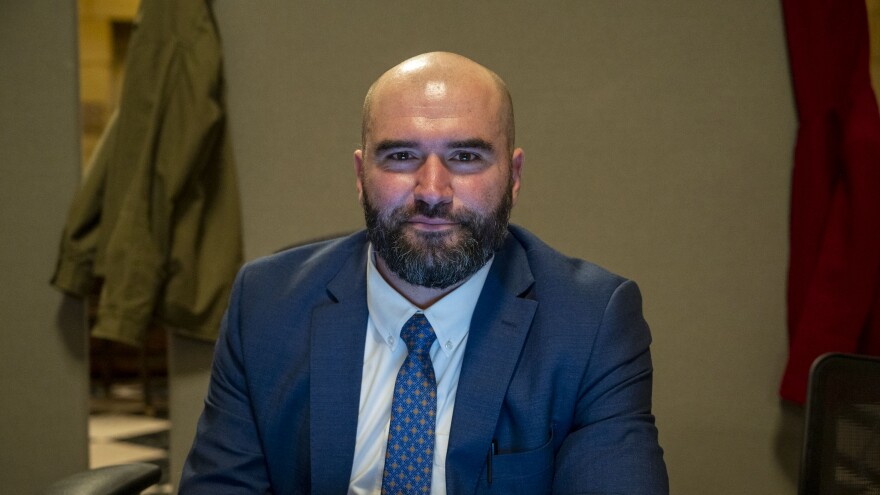The trouble for Rolland Carroll started last fall.
That’s when the 61-year-old said his apartment complex in Cedar Rapids, Iowa, informed him that his federal housing aid for his one-bedroom apartment had been reduced months ago.
He owed more than $2,000 in back rent.
“I was in shock,” Carroll said. “Like, how the heck could I owe this amount of money without you guys saying something months ago?”
Carroll doesn’t own a car and works odd jobs through a local temp agency. He struggled to pay the back rent and come up with $339 for his portion of the monthly rent.
“November and December – there had been hardly any work at all. So I was in a real bind,” he said.
A few days after Christmas, his apartment complex filed to evict him.
Carroll said he was worried because local shelters were full and he has many chronic health issues that cost money.
“I'm diabetic. I have arthritis. I have asthma. I’m just a total mess,” he said.
With the help of nonprofit Iowa Legal Aid, Carroll successfully got the case dismissed at his hearing in mid-January because his apartment failed to give him sufficient notice.
Now, he said he’s still struggling to pay rent and his apartment continues to send him notices threatening to file another eviction.
It’s taking a toll on his health.
“I've been so darn stressed out,” Carroll said. “My mental health is really poor at the moment.”
Eviction as a health issue
With the end of pandemic-era housing support like eviction moratoriums and federal rental assistance, many Midwesterners face housing insecurity.
Eviction filings in Iowa have been increasing for the past decade. After a short dip in 2020 and 2021, they hit a record high of more than 18,000 in 2022, according to Iowa Legal Aid data.
The eviction moratorium issued by the Centers for Disease Control and Prevention ended in mid-2021.
And Iowa – like most states – ended its federally-funded emergency rent and utility program last year.
“Rent makes up a huge portion of the household expenses,” said Nick Graetz, a postdoctoral research associate with Princeton University’s Eviction Lab. “And it’s just been spiking at unprecedented rates during the pandemic. But rents have been outpacing wages for decades.”
Since March 2020, the average rent for a one-bedroom apartment has increased 13% percent in Iowa, nearly 18% percent in Missouri and more than 26% percent in Indiana, according to the U.S. News and World Report.
Eviction filings are trending upward in Indiana and Missouri, too.
Facing eviction can take a huge toll on someone’s health, Graetz said.
“The result is that people go from paying 60% of their income on rent to 70% of their income on rent, and sort of just have to absorb that cost by forgoing things like preventative health care, facing higher food insecurity, you know, things like that,” he said.
According to a literature review published in the journal Social Science and Medicine, studies have tied eviction to depression, anxiety, high blood pressure and child maltreatment.
A 2021 study published in the journal Pediatrics found women in Georgia who faced eviction during pregnancies were more likely to have children with lower birth weights.
Chronic health issues or a health emergency can also put a renter at higher risk for eviction.
“It's hard when you're trying to navigate something like that, “Graetz said. “Maybe [you] fall behind on rent, and then you can quickly get into this space where it becomes really difficult to avoid an eviction filing.”
Possible legislative help
Federal and state lawmakers have proposed a variety of policy solutions to combat evictions, including new tenant protections and expanding emergency rental assistance programs.
Iowa lawmakers have allocated more than $300 million for tax credits to incentivize developers to build affordable housing.
Minnesota lawmakers are considering a rent voucher program that could help 220,000 households.
However, it’s often unclear which policies are most effective, said Katie Moran-McCabe, the lead law and policy analyst at Temple University’s Center for Public Health Law Research.
“We often don't see those laws being evaluated,” she said. “So is the law working? Is it doing what it's intended to do? Are there any unintended consequences?”
Nonprofit programs step up
One growing solution has been eviction diversion programs, like the eviction diversion help desk program run by Iowa Legal Aid.
The nonprofit launched the program in spring 2020, which placed an eviction help desk in the courthouse of Polk County, Iowa’s most populous county.
Similar programs exist in Illinois and Missouri.

The rapid rise in requests for eviction assistance compelled the Iowa Legal Aid to reshuffle its priorities, executive director Nick Smithberg said.
“Basically, it's structurally changed our organization,” he said. “Where historically housing work was about a quarter of our caseload, it's risen to half.”
Since 2020, the program expanded to five other county courthouses. Smithberg said he would like to see it in more.
“I think that we're going to see a very, very disturbing time in the history of this state,” he said. “It's just an all-time record. I don't think people have seen the effects of something like this for a sustained period of time. And I think that it's going to be very eye-opening for a lot of folks when you start seeing people out on the streets.”
Eviction is a civil proceeding, which means defendants are not constitutionally guaranteed the right to an attorney the way they are when facing criminal charges.
In the Midwest, only a handful of cities in Ohio, Missouri and Minnesota legally guarantee renters facing eviction a right to an attorney.
Most renters fighting evictions – who are disproportionately women, people of color and those with disabilities – rely on programs, like Iowa Legal Aid, if they’re available.
Jon Biderman, an attorney with Iowa Legal Aid who helps run the eviction help desk at the Linn County courthouse in eastern Iowa, said his job is often to work out a deal with landlords so renters can have more time to come up with a plan.
He wants to help tenants avoid adding an eviction to their record, which can make finding housing much more difficult.
“Homelessness – being put out – is such a crisis for a person that if you're able to prevent that, or even buy them a week, that can really make a difference in a person's life,” he said.

Other programs like the Health and Human Rights Clinic at Indiana University’s Robert H. McKinney School of Law have also shifted their priorities away from other health care-related cases, like access to insurance and affordable prescription drugs, to focus more on housing.
“Originally we did mostly access-to-health care type work,” said Fran Quigley, a clinical professor at IU, who directs the clinic. “But during the pandemic, the most critical need we saw in our community was responding to housing.”
Quigley said it’s going to take much more than eviction diversion programs like his to tackle this growing public health crisis.
He said he’d like to see major policy changes, like stronger tenant protection laws and much more funding behind federal housing vouchers, to keep people in their homes.
“We, as a nation, make a mistake of treating housing as a commodity and not a right,” he said.
This story comes from a collaboration between Side Effects Public Media, based at WFYI, and the Midwest Newsroom — an investigative journalism collaboration including IPR, KCUR 89.3, Nebraska Public Media News, St. Louis Public Radio and NPR.


